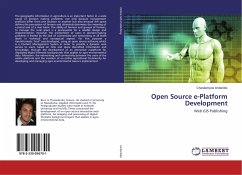
Controlling Visibility of Class Extensions
Classboxes
Versandkostenfrei!
Versandfertig in 6-10 Tagen
39,99 €
inkl. MwSt.

PAYBACK Punkte
20 °P sammeln!
Unanticipated changes to complex software systems canintroduce anomalies such as duplicated code, suboptimalinheritance relationships and a proliferation of run-timedowncasts. Refactoring to eliminate these anomalies may not be an option, atleast in certain stages of software evolution.A class extension is a method that is defined in amodule, but whose class is defined elsewhere. Class extensionsoffer a convenient way to incrementally modify existingclasses when subclassing is inappropriate. Unfortunately existingapproaches suffer from various limitations. Either classextensions have a global ...
Unanticipated changes to complex software systems can
introduce
anomalies such as duplicated code, suboptimal
inheritance
relationships and a proliferation of run-time
downcasts. Refactoring
to eliminate these anomalies may not be an option, at
least in
certain stages of software evolution.
A class extension is a method that is defined in a
module, but
whose class is defined elsewhere. Class extensions
offer a
convenient way to incrementally modify existing
classes when
subclassing is inappropriate. Unfortunately existing
approaches
suffer from various limitations. Either class
extensions have a global
impact or they have a purely local impact, with
negative results for
collaborating clients. Furthermore, conflicting class
extensions are
either disallowed, or resolved by linearization, with
subsequent
negative effects.
To solve these problems we present classboxes, a
module system
for object-oriented languages that provides for
behavior refinement
(i.e., method addition and replacement). Moreover,
the changes
made by a classbox are only visible to that classbox
(or classboxes
that import it), a feature we call local rebinding.
introduce
anomalies such as duplicated code, suboptimal
inheritance
relationships and a proliferation of run-time
downcasts. Refactoring
to eliminate these anomalies may not be an option, at
least in
certain stages of software evolution.
A class extension is a method that is defined in a
module, but
whose class is defined elsewhere. Class extensions
offer a
convenient way to incrementally modify existing
classes when
subclassing is inappropriate. Unfortunately existing
approaches
suffer from various limitations. Either class
extensions have a global
impact or they have a purely local impact, with
negative results for
collaborating clients. Furthermore, conflicting class
extensions are
either disallowed, or resolved by linearization, with
subsequent
negative effects.
To solve these problems we present classboxes, a
module system
for object-oriented languages that provides for
behavior refinement
(i.e., method addition and replacement). Moreover,
the changes
made by a classbox are only visible to that classbox
(or classboxes
that import it), a feature we call local rebinding.












